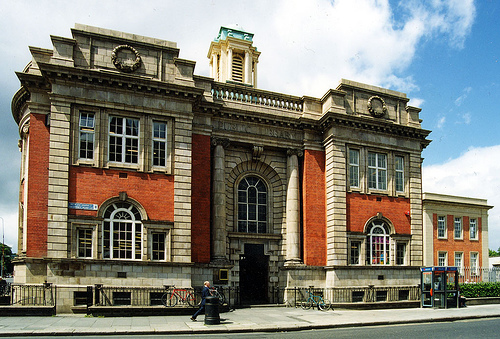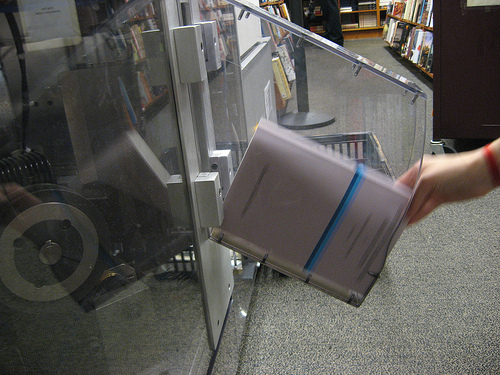What if libraries were publishers?

Imagine if libraries were publishing hubs for their community!
Rather than simply a place to pick up a book to read, it could be a place for authors to learn about publishing, to find top notch guidance, and to actually print or e-publish the books themselves, right there on site. It's inspiring to read Mark Coker, founder of Smashwords, writing this in the Huffington Post:
"Libraries are uniquely qualified to marshal community resources and talent to help local writers become publishers. Local self-published authors, in turn, have an exciting opportunity -- working with the library -- to give back to their community by mentoring the next generation of writers."
Exactly. The library of the future, to me, has a designated floor that looks a lot like an Apple store. That floor has three main purposes:
1. Education: I envision a team of experts, including librarians, literary agents, publishers, editors, designers, marketers, etc. who would keep office/floor hours and be available for walk-in help. At the same time, there would be a regular schedule of classes about every aspect of the publishing process, from writing workshops to launch parties and marketing strategy sessions.
2. Publishing: Libraries should be technology hubs where people can come and use computers to format and publish eBooks. There should also be a Print On Demand (POD) machine for each neighborhood where authors can bring in a flash drive or access Dropbox or email to print out their book file right then and there.
3. Distribution: Imagine decentralized book distribution out of the library, overseen by experts, but involving the authors. Print books that are printed on demand can then get mailed out, thus supporting the local economy and putting more of the profits in the hands of the author, while at the same time funding the library it is happening within. And because eBook publishing needs nothing more than a computer, this would simply be a process of setting aside certain computers for that and staffing them with a person to help authors through the process.
I think those are the three basic pillars, and they're not at all impossible.
What's happening already

In Mark Coker's stellar piece in the Huffington Post where he outlines what he and his company Smashwords are doing to promote eBook publishing in partnership with a local library, and what one Denver library system is doing to fight for affordable eBooks for libraries.
Part 1: Education
Basically Coker and Smashwords are working with the library in Coker's town, Los Gatos, California, to offer educational workshops for authors in 3 areas:
- An introduction to eBooks: Very basic look at what an eBook is, how they work, etc.
- An introduction to eBook self-publishing: This is a primer for authors on the basics of eBook publishing.
- eBook publishing best-practices. This is a more advanced version aimed at authors who want to step up their game and learn the best practices for e-publishing and what has been working for marketing for successful indie authors.
Part 2: Distribution
Coker points out the great things that are happening in the Douglass County Library system, summed up in this open letter from the DCL Director, Jamie LaRue. LaRue writes:
"This is a time of great change in the publishing world. In the print world, public libraries are volume purchasers. Across the nation, we buy about 10 percent of all the books produced by commercial publishers...
Many of our patrons are also interested in eBooks, but lately publishers are changing the rules. Some -- four of the "big six" -- won't sell eBooks to libraries at all. The two that did, HarperCollins and Random House, unilaterally changed the terms. HarperCollins requires us to "buy" the book again after 26 checkouts. (It's really more of a license to read than a purchase.) Random House recently raised the price of a new eBook by 300 percent. So a fiction title might cost $80; a non-fiction title, $120...
In a free market, companies are free to set their prices. But we are free to seek a better deal - and we've found one."
This letter (and the above are just excerpts, the whole thing is clear, concise and great) is great for a few reasons.
1) Behind the curtain: LaRue is ultra-transparent about the cost to a library for a book and about what publishing companies are charging. No one is going to read that letter and think, "yeah, publishers should really be charging more for eBooks. That makes sense."
2) Underdog: Following the behind the curtain information, libraries are recast as underdogs fighting for information freedom in a new world rather than ancient dinosaurs of a crumbing institution. They end up looking more like a slick startup fighting for open source rights than an outdated institution trying to gasp for breath. Kudos on that shift. It will be true if the libraries live it out.
3) Embraces Economics: This is not another librarian asking you to donate your used books at the local cardboard box drive. This is a business person saying, "Hello everyone. We are savvy book shoppers who can't afford the skyrocketing rates that major publishers are charging us. Instead, we've found better rates elsewhere, which is basically how capitalism works. Just wanted to let you know." Awesome.
What do you all think? What would you want to see in your future library?
Images courtesy of Dublin City Public Libraries via flickr and herzogbr via flickr

2 comments